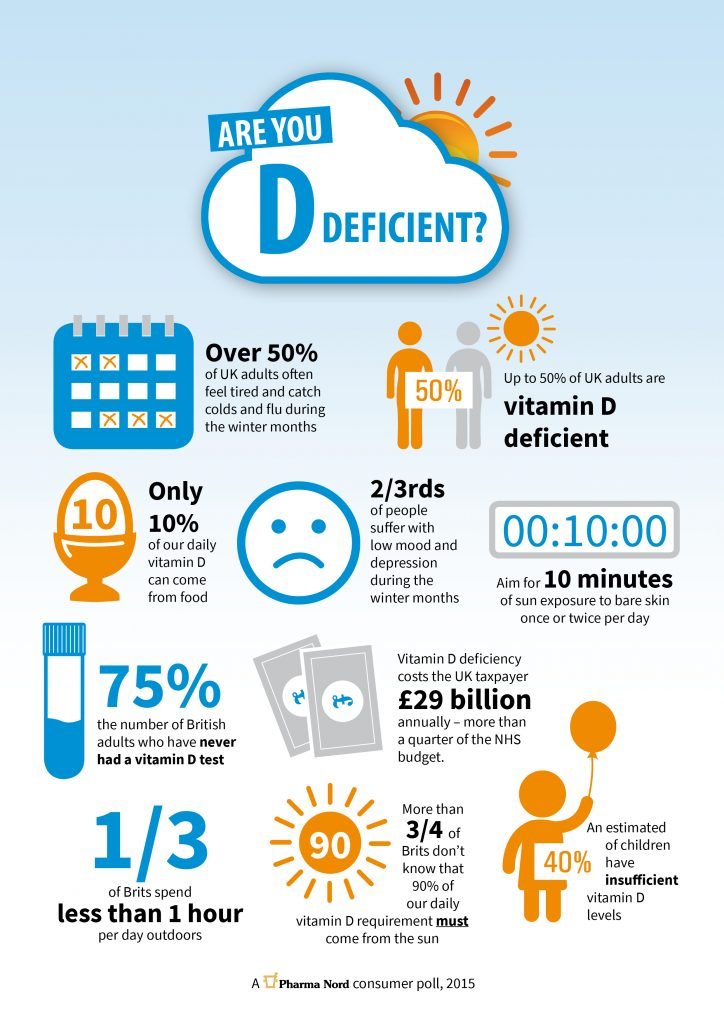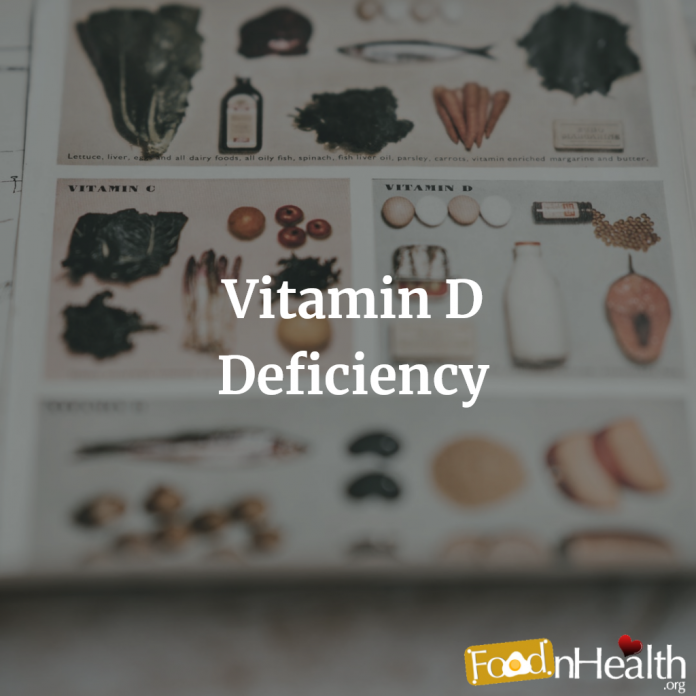About three-quarters of the US population of adults and teens suffers from vitamin D deficiency. And it’s not just a problem in the US only. It is a global epidemic. Fortunately, research indicates that the problem is reversible.
Thanks to increased awareness, vitamin D intake has climbed from 2% between 1988-1994 to 12% in 2009-2010. The sun is a great source of vitamin D.
Moreover, certain foods have a high content of the vitamin too. A lack of the vitamin in the body is, however, linked with a slew of health risks.

Let’s take a look at the health concerns associated with vitamin D deficiency:
-
Osteoporosis
The link between osteoporosis and vitamin D deficiency is a well-studied one. Vitamin D is critical for bone health as it supports the absorption of calcium from the intestine. Without the adequate presence of this vitamin in the body, the bones are not able to utilize calcium despite its abundance in the body.
Therefore, a mild to a moderate shortage of vitamin D can result in pains and aches, along with a loss of bone density and strength. In extreme cases, it can lead to osteoporosis. Currently, 200 million women around the world are living with the disease.
-
Prostate cancer
A 2014 study unearthed a potential association between low markers of vitamin D and prostate cancer among African-American and European-American men. The study couldn’t say for sure that vitamin D deficiency results in prostate cancer. However, it established that declining levels of the vitamin in the body could boost the odds of developing cancer.
On the other hand, people with cancer exhibit poor survival rates in cases of sunlight vitamin deficiency. Researchers highlighted that a 10-point increase in vitamin D could increase the chances of survival in cancer patients by 4%. The strongest link to recovery was prevalent in breast cancer, lymphoma, and colorectal cancer patients.
-
Dementia
A dementia test that confirms the presence of the neurodegenerative brain disorder can be disturbing. Evidence published in Neurology indicates that a moderate to a severe drop in vitamin D levels in seniors doubles the risk of some forms of dementia.
The same study also says that older people who had moderate vitamin D deficit showed a 53% increased risk of dementia.
People with a severe deficiency of the vitamin have a 125% higher risk of developing the brain disorder. It’s best to lower the chances of the early signs of Alzheimer’s by adequate exposure to sunlight and eating vitamin D rich foods.
-
Depression
Plummeting levels of vitamin D in the body correlate with depression too. People with low vitamin D in their body are twice more likely to have depression. The hippocampus and other sections of the brain that are concerned with mood regulation have vitamin D receptors.
Subsequently, any decline of the sunlight vitamin impairs the ability of these brain regions to function normally. About 6.7% of the US population has experienced a major depressive episode. A deficiency of this vitamin only supports the odds of becoming depressed.
-
Heart disease
Extensive studies see a correlation between low levels of vitamin D and heart diseases. However, science is still not sure if vitamin D supplements can rectify heart conditions.
Vitamin D deficiency corresponds with serious heart problems such as heart attacks, coronary heart disease, and strokes.
It is also the culprit behind hypertension, atherosclerosis, and diabetes. Recent research has speculated that vitamin D3 can potentially help reverse heart damage. It is understood that this version of vitamin D plays a critical role in preserving and correcting the damage done to the endothelium.
-
Psoriatic arthritis
Roughly 30% of the people who have psoriasis also experience a condition termed psoriatic arthritis. In this condition, the immune system attacks the joints, which reaches a finale of inflammation and pain.
On top of that, a study outlines that 62% of the people who have psoriatic arthritis show an insufficiency of vitamin D as well.
Research also claims that a decline in the vitamin D markers aggravates inflammatory conditions like psoriatic arthritis. Subsequently, a lack of the sunlight vitamin stands behind psoriatic arthritis too.
-
Erectile dysfunction (ED)
Researchers are of the opinion that vitamin D deficiency is also responsible for erectile dysfunction. They understand that low levels of the vitamin impend the ability of the arteries to dilate. This condition is referred to as endothelial dysfunction, and it results in erectile dysfunction.
A small study of a participant pool of 143 participants pointed out the relation. It showed that men with severe ED had critically low vitamin D markers than men with mild ED. Another study concluded that a shortage of vitamin D culminated in arterial stiffness, which contributes to ED.
-
Pneumonia
Low vitamin D levels also increase the risk of developing pneumonia by 2.5 times. A deficit of the sunlight vitamin takes its toll on the weakening immune system.
Once the body’s defense mechanism weakens, its easier for respiratory infections and other common illnesses to take root.
In contrast, a healthy presence of vitamin D in the blood fights inflammation caused by pneumonia. It also enhances the number of proteins, which curtail germs. Some studies also indicate that higher vitamin D levels help recover from pneumonia faster. On the other hand, people with low vitamin D markers have an increased likelihood of suffering from more severe symptoms of pneumonia.
Final words
Vitamin D plays a fundamental role in the body. A drop in its levels can become a cause of multiple health concerns.
These include a negative impact on the heart health and poor mental well-being. At the same time, vitamin D deficiency shoots the risk of erectile dysfunction, pneumonia, prostate cancer, dementia, and psoriatic arthritis. It also weakens the immune system and slashes the survival rate of cancer patients.
Thus, it is best to include vitamin D enriched foods and spend some time outdoors.























